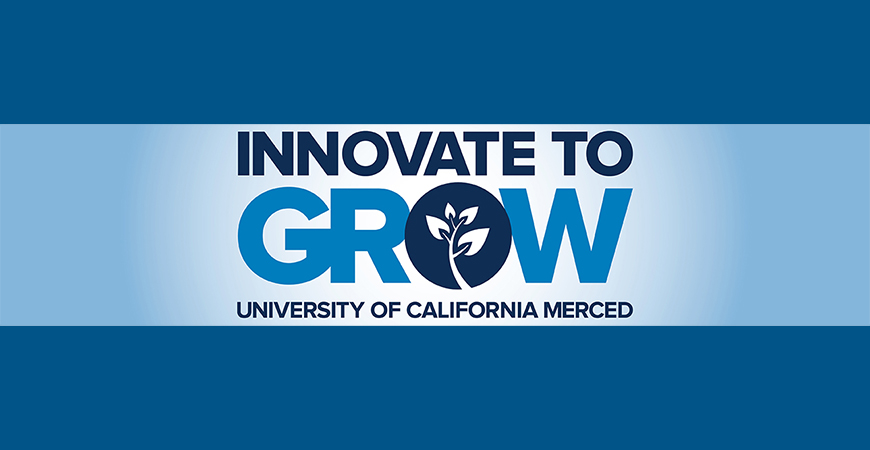
You can’t avoid seeing grazing cattle in California’s Central Valley, where UC Merced has its own pastured cows on campus. Now imagine if those cows were kept secluded without the use of a fence, or at least not one visible to the eye.
This is just one of the experimental projects teams of undergraduate students are working on and will demonstrate during Innovate to Grow (I2G), a biannual experiential learning program which culminates in a presentation expo. Students showcase solutions they’ve engineered to problems posed by real-world companies, organizations and agencies. This year’s projects offer solutions for issues in a range of industries, including agriculture, transportation, pest control, cycling and more.
California AG Solutions proposed the project on cattle fencing, which five students collaborated on for the past semester, mainly via Zoom. The team comprises Francisco Michel (third-year transfer, Mechanical Engineering), Neel Patel (fourth-year, Computer Science and Engineering), Jacob Nesslage (fifth-year, Environmental Engineering), Habibatu Mboka (fourth-year, Computer Science and Engineering) and Enrique López Santoyo (fifth-year, Mechanical Engineering).
The team came up with a virtual fence that keeps cattle within a specified area but is keeping the technology proprietary until after team members present at I2G. The team even created a prototype for the expo on Friday.
“We looked at what is currently on the market and research papers on the topic to implement a virtual fencing technique and created our own,” said Mboka.
“It’s an alternative to stakes on the ground with barbed wire,” Michel said.
Fencing for cattle can be expensive. Prices run from $2 to $10 per linear foot, team members said. That can easily amount to a hefty investment for farmers to protect their cattle.
“The aim is to get rid of physical fences,” added Patel.
Without physical barriers in place, the cows would graze rotationally, which has added benefits for the soil.
Nesslage, who has worked with the USDA before and has an active interest in agricultural engineering, said the virtual fences would also promote carbon sequestration.
“A virtual fence — based on software and without human intervention — would be able to improve soil health,” Nesslage said.
I2G began in 2012 to encourage School of Engineering students to collaborate with industry, nonprofit and government agencies that could benefit from their innovative ideas. Nine years later, the program is still going strong.
“This is an experiential learning program that I like to say is a win-win-win,” said Stefano Foresti, director of innovation for the School of Engineering. Foresti works year-round to cultivate and maintain industry partnerships for the campus’s program. “It’s a win for the students because they have the opportunity to work on real-world problems with clients, which also opens up future opportunities for them. It’s a win for our industry partners because they may get solutions to their problems, and also an opportunity to view and potentially hire graduates by seeing them at work. And it’s a win for our campus because it allows UC Merced to build a unique and stronger education program in engineering.”
It’s a mandate of the engineering program to apply classroom learning to real-world problems. The I2G expo is just the final piece of a semester-long endeavor. The students represent one of three classes: Engineering Capstone, Engineering Service Learning and Software Engineering Capstone. They are each grouped into teams of three to five and each team is assigned a project that matches the students’ areas of skills and majors. This year, multiple teams were assigned to each idea, tasked with finding a host of solutions to a singular problem.
“The I2G event, one of UC Merced’s largest, is the culmination and showcase for our School of Engineering graduating seniors,” said Dean Mark Matsumoto. “In this virtual expo, viewers from our sponsoring partners and the community will see that the challenges brought on by the COVID-19 pandemic have been met with the spirit of determination, innovation and creativity that define UC Merced students.”
The spring 20201 expo is made possible by several industry sponsors, including: Morning Star, E&J Gallo Winery, Omron, Oportun, Farm Data Systems, Veracruz, Blue Diamond Almond Growers, Waymo, Sensient Natural Ingredients, Cisco, Agrecom, Bay Area Rapid Transit (BART), Milano Technical Group, Corigin, Jatco, California Ag Solutions, Sweep, Merced College, Diamond J Farming, The PI Shop, United Way of Merced County, Healthy House, The Discovery Center, Fresno Institute of Technology and the National Science Foundation Engineering Research Center for the Internet of Things for Precision Ag.
This year the event will be virtual for the third time, meaning students and community partners can engage from the comfort of their own homes. Those interested in learning more about I2G and registering to attend this year’s expo can do so here.

